Review: Capone (2020)
So much for the idea that there are no second acts in Hollywood. Somehow, after the absolute commercial and critical embarrassment of Fantastic Four in 2015 (which I called the worst superhero film), Josh Trank has returned. He was even able to raise $20 million and attract a respected star like Tom Hardy to make this utterly uncommercial film about Al Capone dying as a syphilitic 48-year-old man in a mansion in Florida. To be clear, Capone is an independent film and was released on demand due to the pandemic so let’s not mistake it for a big-time comeback. But a few years in the wilderness is a relative pittance to pay for another chance to make a Hollywood film, especially considering that it often takes directors more than five years to raise funds for their next project. And that Trank would want to make this exact film as his comeback is utterly bizarre. Capone is a biographical drama that attempts to deconstruct a mythic crime figure, but gets bogged down in the piss, shit, and incomprehensible ravings of said figure.
Hardy plays Capone, who has been released from prison and allowed to live out his final days in his sprawling mansion in Florida alongside his wife, Mae (Linda Cardellini). Hardy is caked in makeup and puts on one of his now-typical silly voices as Capone, muttering in Italian or croaking like a frog whenever he says something. At points, he’s completely inaudible, while at others, you wonder whether he’s channeling the spirit of a drunken late Brando in his stylistic choices. It’s a flabbergasting performance, but strangely transfixing, as if you’re curious how far he’ll go in embodying the mentally and physically-decaying crook when he shits the bed and can’t tell who’s who.
Hardy is one of Hollywood’s most talented performers, but he can be something of a bulldog in a china shop; you’ve got to keep him on the leash or he’s liable to bust up the joint. Occasionally that produces accidental gold, as it does in the superhero film Venom (2018), which is hilarious, but it’s more likely to produce Capone, where you have to wonder whether the young director returning from exile was so terrified of the famously-hulking performer that he never gave him any notes. Or perhaps Hardy does exactly as Trank envisioned for the film. Perhaps this is what true on-set collaboration looks like, but if that’s the case, perhaps the producer should’ve had some more words during filming.
The operating spirit behind the film is one of demystification: Trank wants to bring Capone down to the level of a human and, by doing so, simultaneously destroy the myths about him while also imbuing him with some human pathos. It’s an admirable goal, but Trank ends up hitting the one note of Capone’s fallibility over and over. Once you get used to the fact that Capone died as a deranged, prematurely old man who couldn’t stop pissing and shitting himself, the novelty fades quickly.
As well, Trank doesn’t seem to be only interested in the myth of Capone. He seems to be taking out his frustrations on Hollywood through the proxy of one of its favourite subjects. By showing how decrepit and pathetic Capone is—a man that Hollywood spent decades glamorizing—Trank is extending the deconstruction to Hollywood itself. He does this by adding a meta element to Capone’s dreamlike reflections of the past, having Capone physically enter into his memories by wandering into a room in his mansion like he has found himself on a soundstage of actors playing out his past. The film’s most interesting sequence has Capone wander off into a massive ballroom New Year’s Eve party populated by figures from his past while Louis Armstrong sings “Blueberry Hill” like a dirge on stage. The scene is clearly replicating the atmosphere of the Gold Room in Stanley Kubrick’s The Shining (1980)—Trank doesn’t show the deepest well of cinematic references—but at least it’s atmospheric and mysterious and captures the intriguing possibility of Trank’s approach.
But scene’s like this one are rare in Capone. Most of the film is spent manufacturing pathos for our lead character through some glimmers of regret and creating suspense by introducing the notion of $10 million hidden on the property by Capone before going to prison. Kyle MacLachlan amuses as a doctor trying to suss out the location of the money for the feds, but these scenes still devolve into Tom Hardy drooling onto silk pajamas while Trank tries to frame him on the screen like he’s Vito Corleone.
Trank’s desire is to demythologize a notorious gangster, but he cannot escape the tools of Hollywood mythmaking in his filmmaking. Why else borrow a lighting style from the most famous film to glamourize Italian-American gangsters? It seems counterproductive. Perhaps he doesn’t know better. I don’t want to knock a person for trying to exorcise some demons on screen. And there’s something genuinely original to the film’s overall conceit. But Capone is interesting purely as an oddity, a bizarre comeback, and a mystifying star vehicle for a talented actor who can’t stop doing silly voices.
At least it’s not another Fantastic Four.
3 out of 10
Capone (2020, USA)
Written and directed by Josh Trank; starring Tom Hardy, Linda Cardellini, Matt Dillon, Al Sapienza, Kathrine Narducci, Noel Fisher, Kyle MacLachlan.



Nia DaCosta’s sequel to 28 Years Later pits two competing theologies of death against each other.